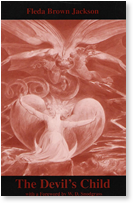 “Writing About Horrible Things,” Part II, in which I take another look at my collection of poems, The Devil’s Child (Carnegie Mellon University Press, 1999). I don't want Barbara's story, her suffering and her heroism, to be forgotten. (Read Part I for the whole story).
“Writing About Horrible Things,” Part II, in which I take another look at my collection of poems, The Devil’s Child (Carnegie Mellon University Press, 1999). I don't want Barbara's story, her suffering and her heroism, to be forgotten. (Read Part I for the whole story).
The poems evolved like this: because I wrote only Barbara's lone, sad voice, the poems were more than I could stand and more than I figured a reader could stand. So I tried adding a second voice, that of a writer, Suzanna, who’s listening to her and trying to make sense of her pain. Barbara and the writer got too entangled, each conflating the other’s miseries. I found I needed to triangulate. I added the voice of a Catholic priest. I realized we need the media—the Editorial page, a Greek chorus, the voice of outraged community—but still, as the priest does, we bring our own life and suffering to bear.
Suzanna is like me in that as a child, she tried to rationalize everything to avoid feeling pain. I picked the name Suzanna because of Suzanna and the Elders—Wallace Stevens' poem, "Peter Quince at the Clavier," which is taken from the Book of Daniel in the Apocrypha of the Bible:She bathed in her still garden, whileThe red-eyed elders watching, feltthe basses of their beings throbin witching chords…That poem has always frozen my blood.I put Father Andrew in partly to get the opposite point of view. The satanic rite is entirely dependent upon Catholicism—it's the obverse of it, the mockery of it. At one point in Barbara's story, she tells of having her first communion, then going home. The cult gathered around her, took her new white Bible, circled it and peed on it. And that's only the mild thing they did.How did I get there, into this narrative in which I am, in a sense, everyone? When I was thirteen, I wanted to be a minister, on the far side of all this, the side where there is air to breathe and the bright sky of heaven. I know Father Andrew. I have been him. But it is Barbara's story that takes over, no matter what. It's the blood-and-guts horror of it. Most of us slow down and stare at a car crash, even though we feel bad, like a voyeur, about doing it. We find Paradise Lost much more interesting than Paradise Regained. We own a highly developed cerebral cortex, which makes us conscious that we suffer, have suffered, that we’re going to die. This makes us especially interested in—and empathetic with, one would hope—others' pain and death. But in the same way Barbara has walled off parts of herself that suffer, we like to keep a separation. We like to note that it's someone else, not us, who's in pain this time.Barbara, for instance. When she was a baby, her grandmother used to step on her hands to keep her from crawling. She would stick her feet in the flame of a candle—a kind of ritual. By the time she was a young girl, she was gang-raped by the cult members, hung upside down so that the semen would stay inside, starved and then given strong laxatives, given ritual abortions, made to eat the raw meat of sacrificial animals, made to watch ritual murders, tied in the same position as the victim with no knowledge of whether she'd be next. And on and on.The technique of all cults—religious as well as political—is confusion: "Does my father love me? He rapes me, he allows others to almost kill me with pain, he leads the group in utterly humiliating me, then he holds me and calls me his best girl. He must love me. He's all I have. This must be love." What is the truth? "The nuns tell me one thing at school; the cult does exactly the same church ritual to mock what I've learned at school." Of course her confusion of what love is led her later to marry a vicious man. She says in one poem, "I saw Joe standing there so mean/ he might have been my father, so of course/ I fell in love at once. I was so scared,/ I had to make it with him right then."I think Barbara’s a hero. So what was she to do? What were the choices? She could capitulate and join the cult—as, for instance, most Iraqui youth do—take it over, even, which is what her father wanted her to do. She could go stark raving mad. She could collapse and die. But what she did was to save herself by splitting her personality. When something was too much to bear, she completely walled it off from the rest of herself, so that at least some segment of her felt safe. She had one personality, Patty, who believed that her mother and father loved her very much. Patty went to Sunday School and thought everything was wonderful. She had another personality, Mike, who showed up when she was lying on the floor, in great pain over a forced abortion. Mike was angry as hell—he thought his penis had just been cut off. She had as many as thirteen personalities, all with different names. Barbara believed that she kept her soul tucked in her wrist, all along—a part of her body no one cared about. A student pointed out to me that Suzanna the writer became her wrist. I guess so.
